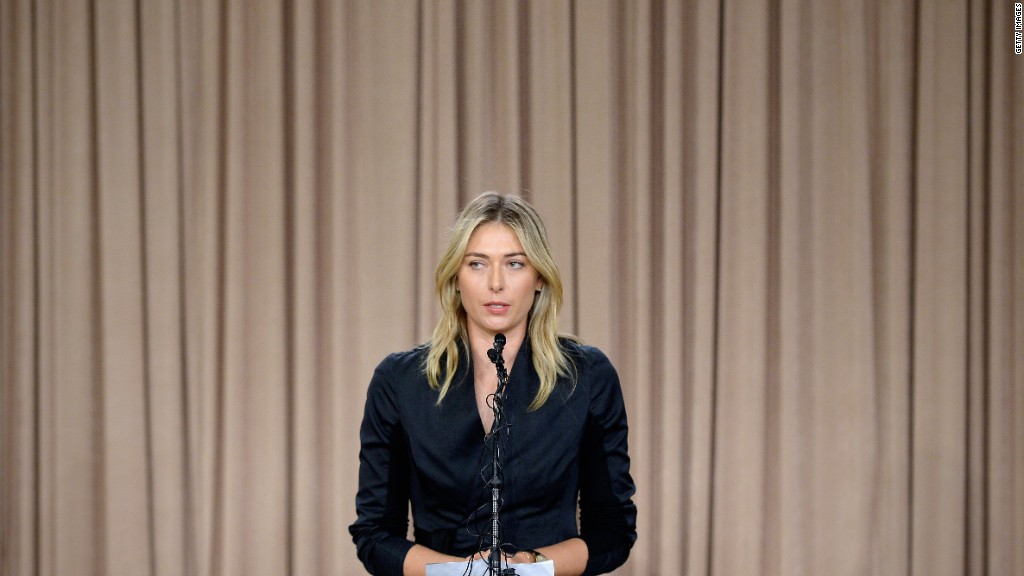
Maria Sharapova, long one of the world's most marketable female athletes, is paying a higher price with her sponsors than many male athletes who have gotten into trouble.
Nike (NKE) and Porsche, which is a Volkswagen (VLKAY) brand, suspended their deals within hours of her admission that she had failed a drug test. And Swiss watch brand TAG Heuer said it was suspending negotiations about renewing a sponsorship deal that ended a few months ago.
Sharapova said Monday that she had been taking the drug, meldonium, for years under a doctor's care for a magnesium deficiency and irregular EKGs. The drug was only recently added to the sport's list of banned substances. The federation said it is banning Sharapova "pending determination of the case."
Nike said it was saddened by the news of the drug test. It suspended its deal with Sharapova -- worth a reported $70 million over eight years -- while the investigation continues.
Related: Nike's long list of disgraced athletes
The world's top endorser of athletes, Nike has more than $6 billion in endorsement deals on its books. The company did not respond to multiple requests for comment for this article. Here is its record in responding to athletes that got into trouble.
Justin Gatlin: A year ago, Nike signed a deal with American track star Justin Gatlin, whose four-year ban for using a performance enhancing drug ended in 2010. It was his second suspension. A Nike spokesman at the time told USA Today that Gatlin had served his penalties.
Lance Armstrong: When the U.S. Anti-Doping Agency banned cyclist Lance Armstrong for life in August 2012 for a history of performance enhancing drug use, Nike issued a statement backing Armstrong: "Lance has stated his innocence and has been unwavering on this position. Nike plans to continue to support Lance."
Two months later, the agency released its report detailing the extent of doping allegations against Armstrong and Nike dropped the cyclist.
Related: How Nike became the king of endorsements
Kobe Bryant: When basketball star Kobe Bryant was charged with sexual assault in 2003, Nike stopped using him in ads but never dropped him. It was the first sponsor to start using him again in ads after Bryant reached a civil settlement with his accuser and the criminal charges were dropped.
Oscar Pistorius: When Oscar Pistorius killed his girlfriend in 2013, Nike waited a week before suspending its sponsorship deal with him, waiting until he was indicted to act.
Michael Vick: When NFL quarterback Michael Vick was charged with dog fighting in 2007, Nike waited a week before suspending its deal with him. It eventually terminated it as the court case proceeded. Vick went to prison after pleading guilty, but Nike signed him again once he was released.
Tiger Woods: When the high-profile marital infidelities of Tiger Woods were made public, Nike did not cut sponsorship ties with the golfer.
FIFA: Nike has not dropped its deals with various soccer organizations, such as Brazil's national team, despite the FIFA bribery scandal. U.S. prosecutors allege that Nike sponsorship dollars were used to bribe officials of the sport, although there are no claims Nike knew.
-- CNNMoney's Jethro Mullen contributed to this report.

